Applying ACS Code of Conduct: Ethical Dilemmas in Software Development
VerifiedAdded on 2023/04/08
|7
|1206
|221
Case Study
AI Summary
This case study examines the ethical concerns surrounding a software development project where code testing is outsourced overseas. The Project Senior expresses concerns about potential plagiarism and the effectiveness of working on three code versions simultaneously. The analysis applies the ACS Code of Professional Conduct, focusing on the primacy of public interest, potential risks of unencrypted code, and the importance of honesty, competence, and professionalism. The study recommends concentrating on a single code version, ensuring proper encryption, and prioritizing ethical conduct to maintain client trust and uphold industry standards. The report concludes that adhering to the ACS Code and focusing on quality and ethical practices are crucial for the ICT industry's integrity and public confidence. Desklib provides this case study and other resources for students.
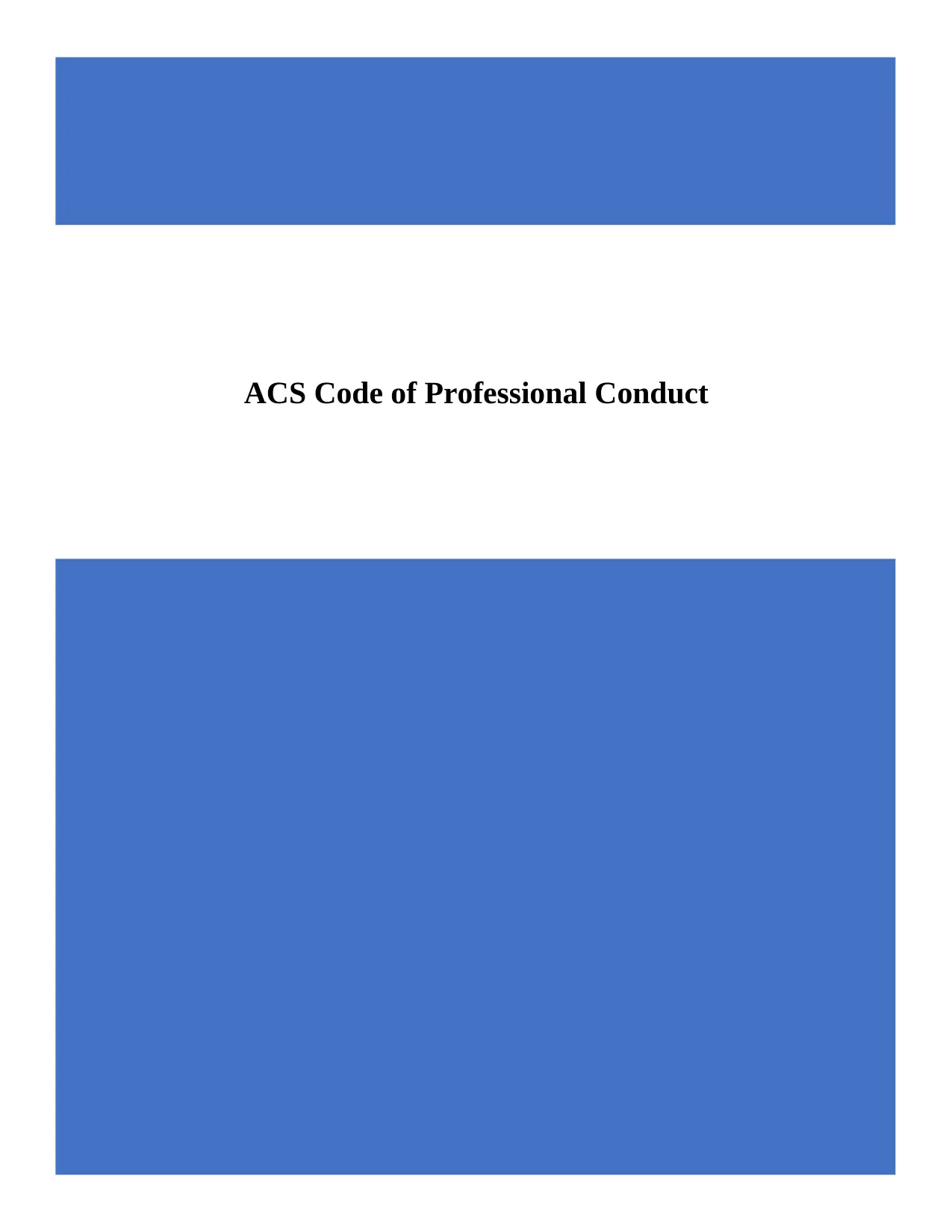
ACS Code of Professional Conduct
Paraphrase This Document
Need a fresh take? Get an instant paraphrase of this document with our AI Paraphraser
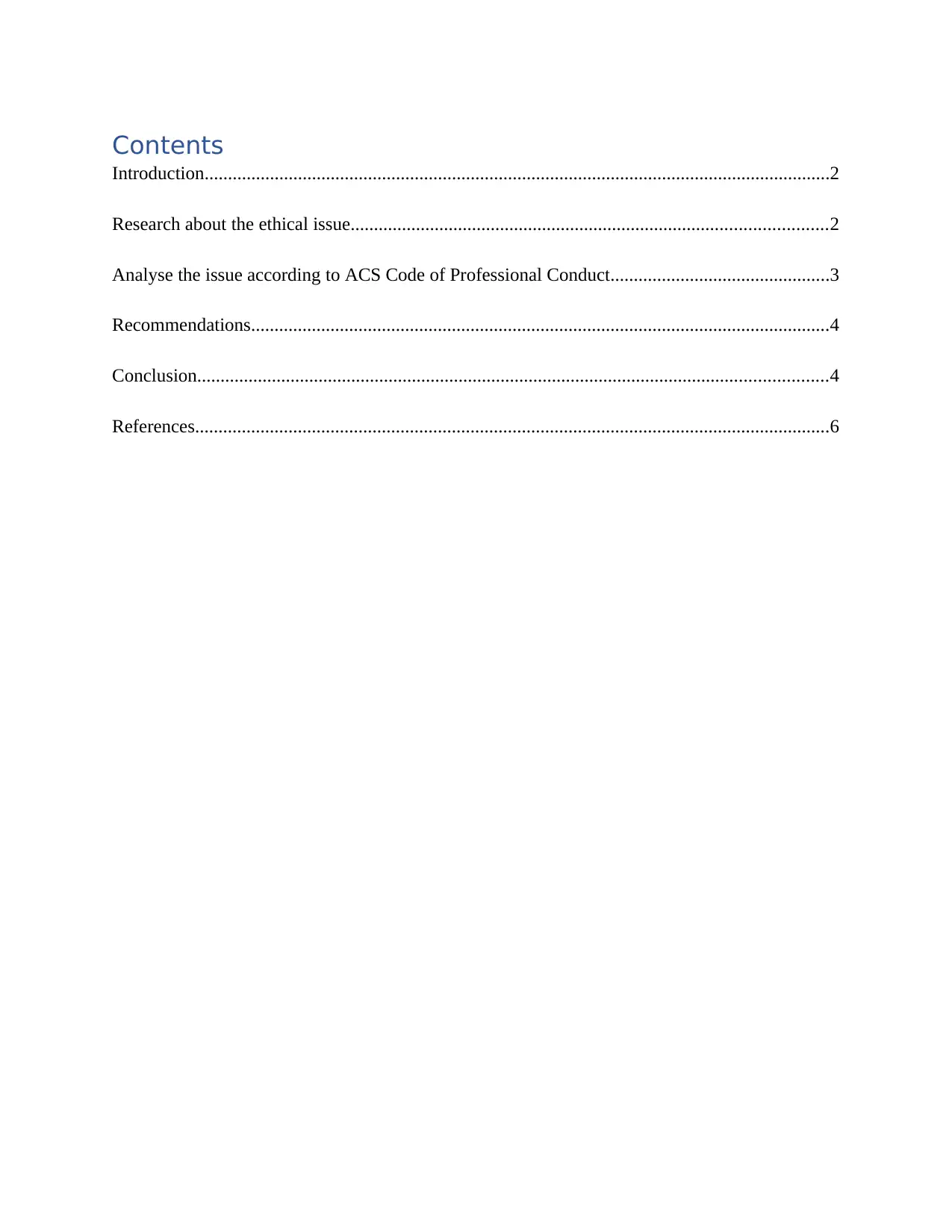
Contents
Introduction......................................................................................................................................2
Research about the ethical issue......................................................................................................2
Analyse the issue according to ACS Code of Professional Conduct...............................................3
Recommendations............................................................................................................................4
Conclusion.......................................................................................................................................4
References........................................................................................................................................6
Introduction......................................................................................................................................2
Research about the ethical issue......................................................................................................2
Analyse the issue according to ACS Code of Professional Conduct...............................................3
Recommendations............................................................................................................................4
Conclusion.......................................................................................................................................4
References........................................................................................................................................6
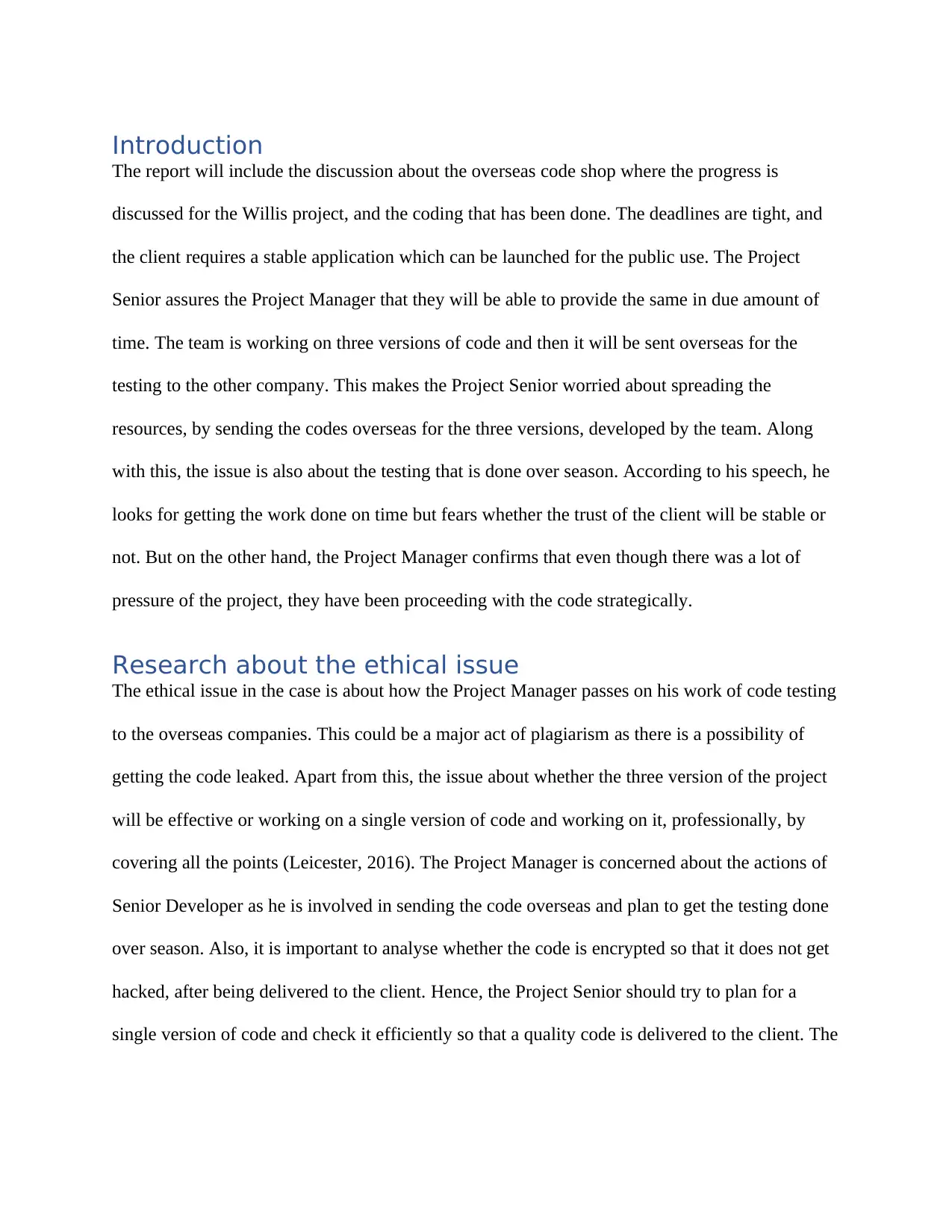
Introduction
The report will include the discussion about the overseas code shop where the progress is
discussed for the Willis project, and the coding that has been done. The deadlines are tight, and
the client requires a stable application which can be launched for the public use. The Project
Senior assures the Project Manager that they will be able to provide the same in due amount of
time. The team is working on three versions of code and then it will be sent overseas for the
testing to the other company. This makes the Project Senior worried about spreading the
resources, by sending the codes overseas for the three versions, developed by the team. Along
with this, the issue is also about the testing that is done over season. According to his speech, he
looks for getting the work done on time but fears whether the trust of the client will be stable or
not. But on the other hand, the Project Manager confirms that even though there was a lot of
pressure of the project, they have been proceeding with the code strategically.
Research about the ethical issue
The ethical issue in the case is about how the Project Manager passes on his work of code testing
to the overseas companies. This could be a major act of plagiarism as there is a possibility of
getting the code leaked. Apart from this, the issue about whether the three version of the project
will be effective or working on a single version of code and working on it, professionally, by
covering all the points (Leicester, 2016). The Project Manager is concerned about the actions of
Senior Developer as he is involved in sending the code overseas and plan to get the testing done
over season. Also, it is important to analyse whether the code is encrypted so that it does not get
hacked, after being delivered to the client. Hence, the Project Senior should try to plan for a
single version of code and check it efficiently so that a quality code is delivered to the client. The
The report will include the discussion about the overseas code shop where the progress is
discussed for the Willis project, and the coding that has been done. The deadlines are tight, and
the client requires a stable application which can be launched for the public use. The Project
Senior assures the Project Manager that they will be able to provide the same in due amount of
time. The team is working on three versions of code and then it will be sent overseas for the
testing to the other company. This makes the Project Senior worried about spreading the
resources, by sending the codes overseas for the three versions, developed by the team. Along
with this, the issue is also about the testing that is done over season. According to his speech, he
looks for getting the work done on time but fears whether the trust of the client will be stable or
not. But on the other hand, the Project Manager confirms that even though there was a lot of
pressure of the project, they have been proceeding with the code strategically.
Research about the ethical issue
The ethical issue in the case is about how the Project Manager passes on his work of code testing
to the overseas companies. This could be a major act of plagiarism as there is a possibility of
getting the code leaked. Apart from this, the issue about whether the three version of the project
will be effective or working on a single version of code and working on it, professionally, by
covering all the points (Leicester, 2016). The Project Manager is concerned about the actions of
Senior Developer as he is involved in sending the code overseas and plan to get the testing done
over season. Also, it is important to analyse whether the code is encrypted so that it does not get
hacked, after being delivered to the client. Hence, the Project Senior should try to plan for a
single version of code and check it efficiently so that a quality code is delivered to the client. The
⊘ This is a preview!⊘
Do you want full access?
Subscribe today to unlock all pages.

Trusted by 1+ million students worldwide
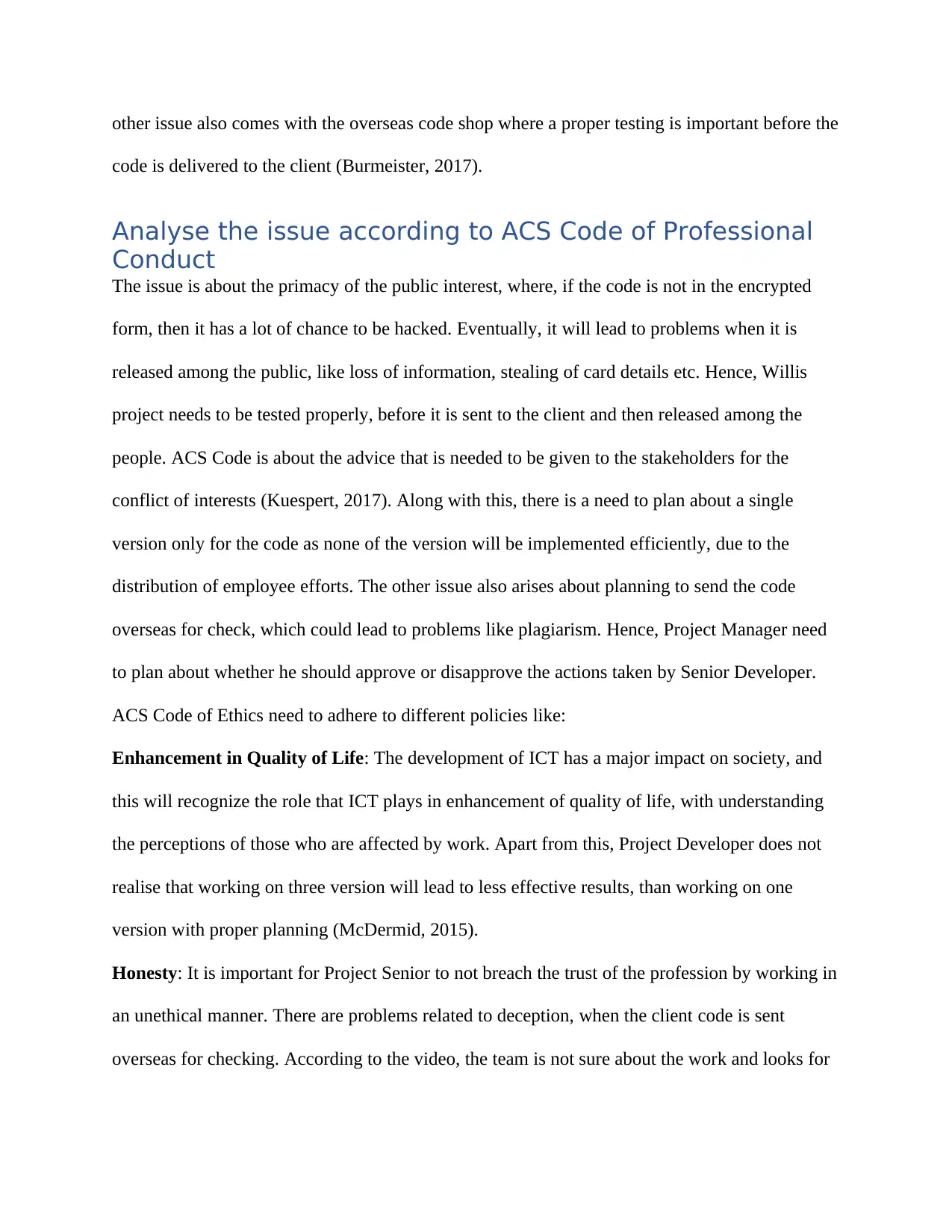
other issue also comes with the overseas code shop where a proper testing is important before the
code is delivered to the client (Burmeister, 2017).
Analyse the issue according to ACS Code of Professional
Conduct
The issue is about the primacy of the public interest, where, if the code is not in the encrypted
form, then it has a lot of chance to be hacked. Eventually, it will lead to problems when it is
released among the public, like loss of information, stealing of card details etc. Hence, Willis
project needs to be tested properly, before it is sent to the client and then released among the
people. ACS Code is about the advice that is needed to be given to the stakeholders for the
conflict of interests (Kuespert, 2017). Along with this, there is a need to plan about a single
version only for the code as none of the version will be implemented efficiently, due to the
distribution of employee efforts. The other issue also arises about planning to send the code
overseas for check, which could lead to problems like plagiarism. Hence, Project Manager need
to plan about whether he should approve or disapprove the actions taken by Senior Developer.
ACS Code of Ethics need to adhere to different policies like:
Enhancement in Quality of Life: The development of ICT has a major impact on society, and
this will recognize the role that ICT plays in enhancement of quality of life, with understanding
the perceptions of those who are affected by work. Apart from this, Project Developer does not
realise that working on three version will lead to less effective results, than working on one
version with proper planning (McDermid, 2015).
Honesty: It is important for Project Senior to not breach the trust of the profession by working in
an unethical manner. There are problems related to deception, when the client code is sent
overseas for checking. According to the video, the team is not sure about the work and looks for
code is delivered to the client (Burmeister, 2017).
Analyse the issue according to ACS Code of Professional
Conduct
The issue is about the primacy of the public interest, where, if the code is not in the encrypted
form, then it has a lot of chance to be hacked. Eventually, it will lead to problems when it is
released among the public, like loss of information, stealing of card details etc. Hence, Willis
project needs to be tested properly, before it is sent to the client and then released among the
people. ACS Code is about the advice that is needed to be given to the stakeholders for the
conflict of interests (Kuespert, 2017). Along with this, there is a need to plan about a single
version only for the code as none of the version will be implemented efficiently, due to the
distribution of employee efforts. The other issue also arises about planning to send the code
overseas for check, which could lead to problems like plagiarism. Hence, Project Manager need
to plan about whether he should approve or disapprove the actions taken by Senior Developer.
ACS Code of Ethics need to adhere to different policies like:
Enhancement in Quality of Life: The development of ICT has a major impact on society, and
this will recognize the role that ICT plays in enhancement of quality of life, with understanding
the perceptions of those who are affected by work. Apart from this, Project Developer does not
realise that working on three version will lead to less effective results, than working on one
version with proper planning (McDermid, 2015).
Honesty: It is important for Project Senior to not breach the trust of the profession by working in
an unethical manner. There are problems related to deception, when the client code is sent
overseas for checking. According to the video, the team is not sure about the work and looks for
Paraphrase This Document
Need a fresh take? Get an instant paraphrase of this document with our AI Paraphraser
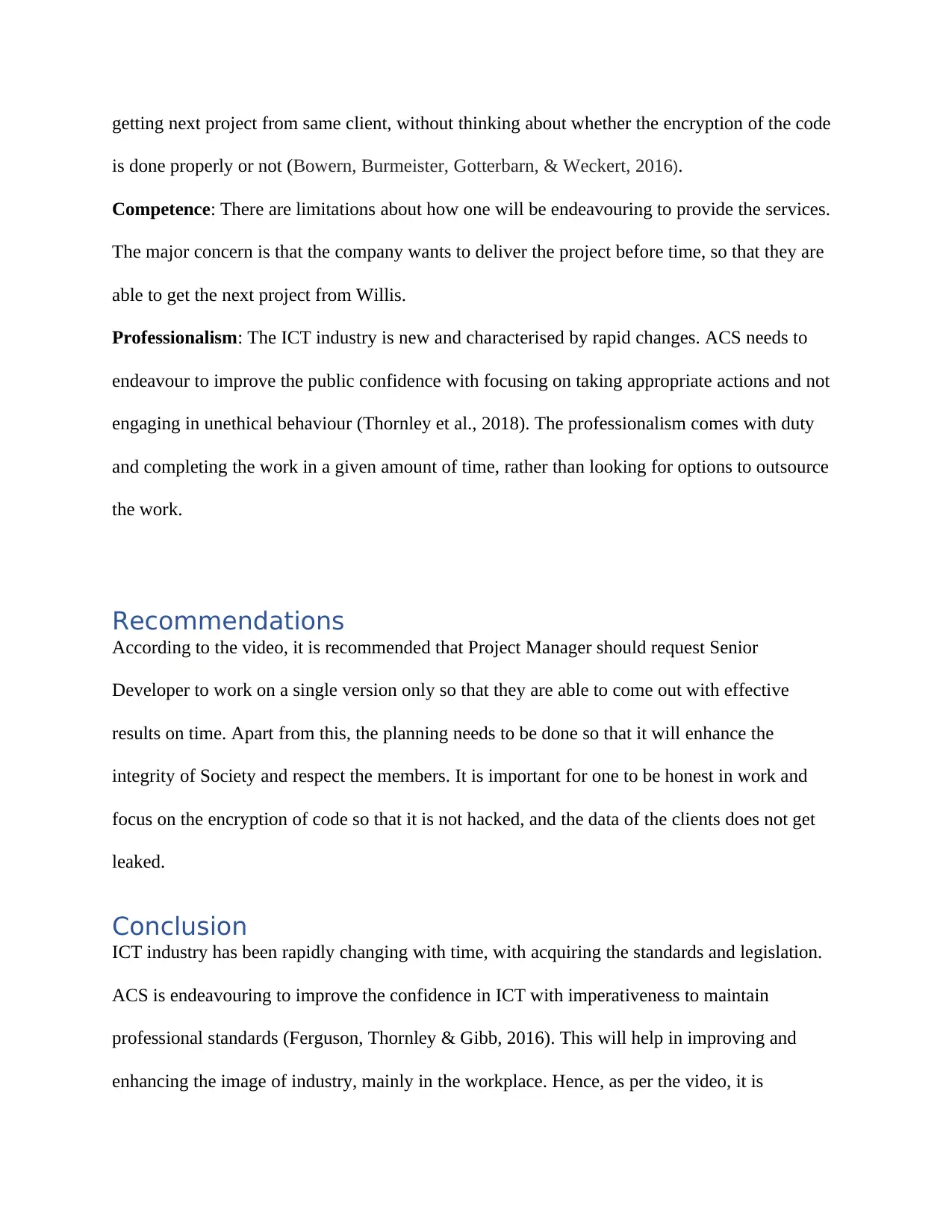
getting next project from same client, without thinking about whether the encryption of the code
is done properly or not (Bowern, Burmeister, Gotterbarn, & Weckert, 2016).
Competence: There are limitations about how one will be endeavouring to provide the services.
The major concern is that the company wants to deliver the project before time, so that they are
able to get the next project from Willis.
Professionalism: The ICT industry is new and characterised by rapid changes. ACS needs to
endeavour to improve the public confidence with focusing on taking appropriate actions and not
engaging in unethical behaviour (Thornley et al., 2018). The professionalism comes with duty
and completing the work in a given amount of time, rather than looking for options to outsource
the work.
Recommendations
According to the video, it is recommended that Project Manager should request Senior
Developer to work on a single version only so that they are able to come out with effective
results on time. Apart from this, the planning needs to be done so that it will enhance the
integrity of Society and respect the members. It is important for one to be honest in work and
focus on the encryption of code so that it is not hacked, and the data of the clients does not get
leaked.
Conclusion
ICT industry has been rapidly changing with time, with acquiring the standards and legislation.
ACS is endeavouring to improve the confidence in ICT with imperativeness to maintain
professional standards (Ferguson, Thornley & Gibb, 2016). This will help in improving and
enhancing the image of industry, mainly in the workplace. Hence, as per the video, it is
is done properly or not (Bowern, Burmeister, Gotterbarn, & Weckert, 2016).
Competence: There are limitations about how one will be endeavouring to provide the services.
The major concern is that the company wants to deliver the project before time, so that they are
able to get the next project from Willis.
Professionalism: The ICT industry is new and characterised by rapid changes. ACS needs to
endeavour to improve the public confidence with focusing on taking appropriate actions and not
engaging in unethical behaviour (Thornley et al., 2018). The professionalism comes with duty
and completing the work in a given amount of time, rather than looking for options to outsource
the work.
Recommendations
According to the video, it is recommended that Project Manager should request Senior
Developer to work on a single version only so that they are able to come out with effective
results on time. Apart from this, the planning needs to be done so that it will enhance the
integrity of Society and respect the members. It is important for one to be honest in work and
focus on the encryption of code so that it is not hacked, and the data of the clients does not get
leaked.
Conclusion
ICT industry has been rapidly changing with time, with acquiring the standards and legislation.
ACS is endeavouring to improve the confidence in ICT with imperativeness to maintain
professional standards (Ferguson, Thornley & Gibb, 2016). This will help in improving and
enhancing the image of industry, mainly in the workplace. Hence, as per the video, it is
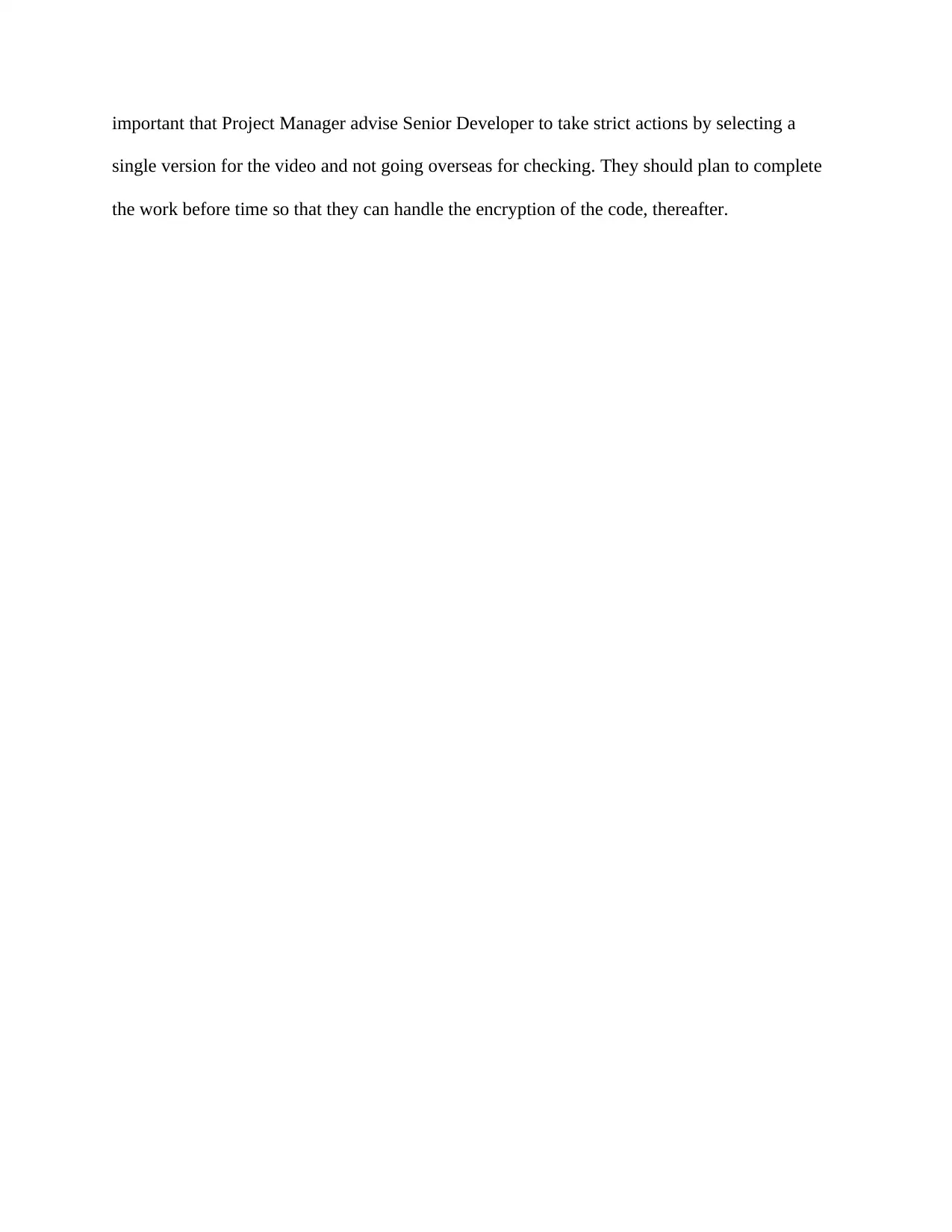
important that Project Manager advise Senior Developer to take strict actions by selecting a
single version for the video and not going overseas for checking. They should plan to complete
the work before time so that they can handle the encryption of the code, thereafter.
single version for the video and not going overseas for checking. They should plan to complete
the work before time so that they can handle the encryption of the code, thereafter.
⊘ This is a preview!⊘
Do you want full access?
Subscribe today to unlock all pages.

Trusted by 1+ million students worldwide
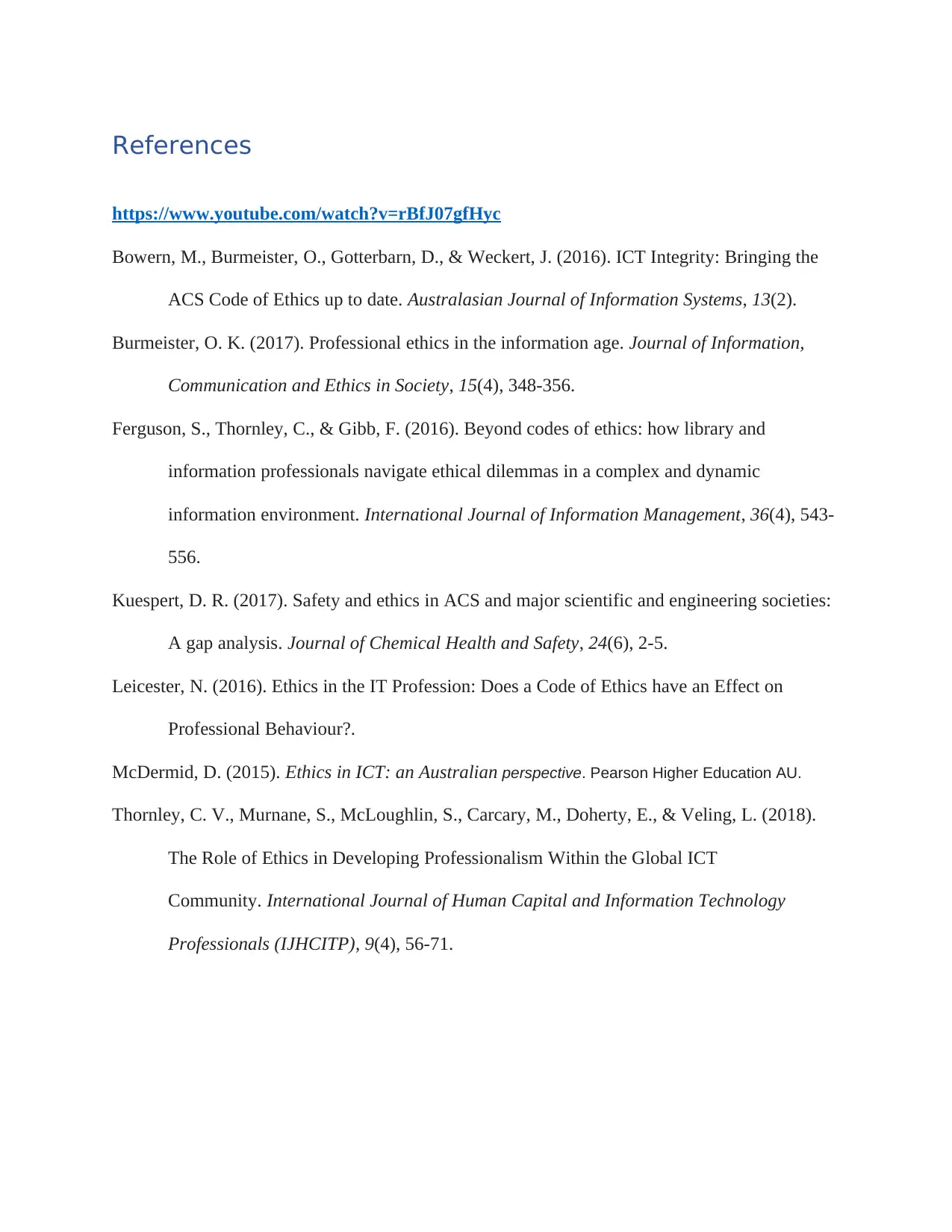
References
https://www.youtube.com/watch?v=rBfJ07gfHyc
Bowern, M., Burmeister, O., Gotterbarn, D., & Weckert, J. (2016). ICT Integrity: Bringing the
ACS Code of Ethics up to date. Australasian Journal of Information Systems, 13(2).
Burmeister, O. K. (2017). Professional ethics in the information age. Journal of Information,
Communication and Ethics in Society, 15(4), 348-356.
Ferguson, S., Thornley, C., & Gibb, F. (2016). Beyond codes of ethics: how library and
information professionals navigate ethical dilemmas in a complex and dynamic
information environment. International Journal of Information Management, 36(4), 543-
556.
Kuespert, D. R. (2017). Safety and ethics in ACS and major scientific and engineering societies:
A gap analysis. Journal of Chemical Health and Safety, 24(6), 2-5.
Leicester, N. (2016). Ethics in the IT Profession: Does a Code of Ethics have an Effect on
Professional Behaviour?.
McDermid, D. (2015). Ethics in ICT: an Australian perspective. Pearson Higher Education AU.
Thornley, C. V., Murnane, S., McLoughlin, S., Carcary, M., Doherty, E., & Veling, L. (2018).
The Role of Ethics in Developing Professionalism Within the Global ICT
Community. International Journal of Human Capital and Information Technology
Professionals (IJHCITP), 9(4), 56-71.
https://www.youtube.com/watch?v=rBfJ07gfHyc
Bowern, M., Burmeister, O., Gotterbarn, D., & Weckert, J. (2016). ICT Integrity: Bringing the
ACS Code of Ethics up to date. Australasian Journal of Information Systems, 13(2).
Burmeister, O. K. (2017). Professional ethics in the information age. Journal of Information,
Communication and Ethics in Society, 15(4), 348-356.
Ferguson, S., Thornley, C., & Gibb, F. (2016). Beyond codes of ethics: how library and
information professionals navigate ethical dilemmas in a complex and dynamic
information environment. International Journal of Information Management, 36(4), 543-
556.
Kuespert, D. R. (2017). Safety and ethics in ACS and major scientific and engineering societies:
A gap analysis. Journal of Chemical Health and Safety, 24(6), 2-5.
Leicester, N. (2016). Ethics in the IT Profession: Does a Code of Ethics have an Effect on
Professional Behaviour?.
McDermid, D. (2015). Ethics in ICT: an Australian perspective. Pearson Higher Education AU.
Thornley, C. V., Murnane, S., McLoughlin, S., Carcary, M., Doherty, E., & Veling, L. (2018).
The Role of Ethics in Developing Professionalism Within the Global ICT
Community. International Journal of Human Capital and Information Technology
Professionals (IJHCITP), 9(4), 56-71.
1 out of 7
Related Documents
Your All-in-One AI-Powered Toolkit for Academic Success.
+13062052269
info@desklib.com
Available 24*7 on WhatsApp / Email
![[object Object]](/_next/static/media/star-bottom.7253800d.svg)
Unlock your academic potential
Copyright © 2020–2026 A2Z Services. All Rights Reserved. Developed and managed by ZUCOL.



